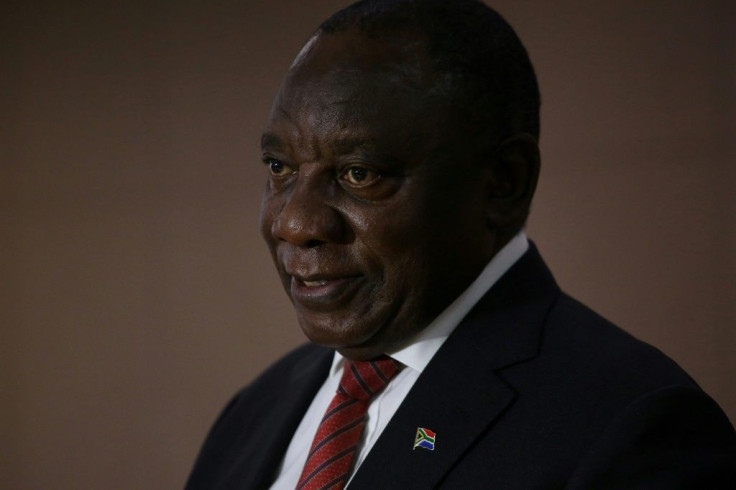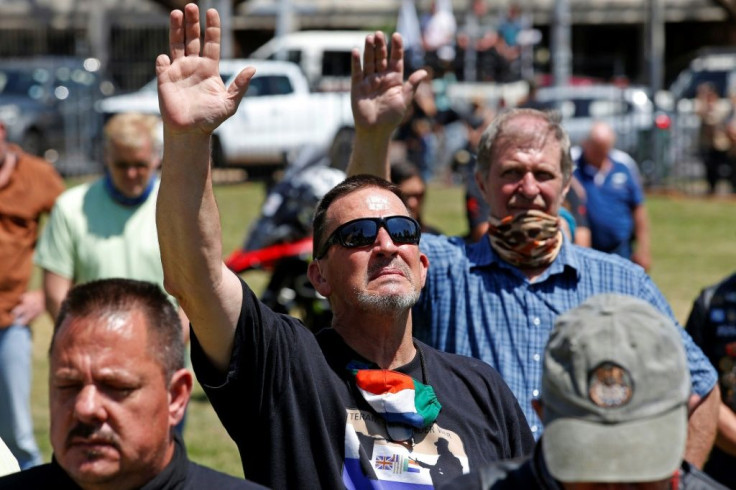S.African Leader Tries To Calm Racial Tension Over Farm Attacks
South Africa's President Cyril Ramaphosa called for calm on Monday, hoping to tamp down rising racial tension in his country following months of protests by white farmers over a spike in deadly attacks.
The tensions reached a new level early last week when a group of mainly white farmers stormed a courthouse during the hearing of two black suspects accused of killing a 22-year-old farm manager.
Ramaphosa, in his weekly newsletter to the nation, rejected claims by pressure groups representing the country's white minority that the farm attacks were racially motivated.
He instead characterised the attacks as a sad reminder that the country was still recovering from its dark past under the apartheid regime, which ended in 1994.
"We would be naive to assume that race relations in farming communities have been harmonious since the advent of democracy," Ramaphosa wrote.

"Unless this is addressed in an open and honest manner, unless we are prepared to engage in dialogue, this will remain a festering wound that threatens social cohesion."
Ramaphosa condemned the murder of the young farm manager earlier this month in the Free State province, around 300 kilometres (185 miles) south of Johannesburg.
He said the spectacle of white farmers storming a court to attack two black suspects "opened up wounds that go back many generations."

The alleged lead instigator of the rioters, Andre Pienaar, who is in his 50s, was subsequently arrested and charged with terrorism on Friday.
Ramaphosa said the incident showed "just how easily the tinderbox of race hatred can be ignited".
Ramaphosa pleaded against attempts to use the farm violence to mobilise communities along racial lines, pointing out that most victims of violent crime in South Africa were black and poor.
"The claim that violent crime on farms is part of an orchestrated campaign by blacks to drive white farmers off their land is simply not borne out by fact," Ramaphosa said.
"Killings on farms are not ethnic cleansing," he added.

"They are not genocidal. They are acts of criminality and must be treated as such."
More than a quarter of century after the end of apartheid, South Africa is battling racial tensions, while economic inequality and poverty haunt the "Rainbow Nation".
White farmers and their supporters have staged protests across the country in recent months against the increase in assaults and killings on farms.
Such attacks had dropped drastically during the first few months of the country's coronavirus lockdown due to restricted movement, but from June the assaults spiked, according to farmers.
The latest protest was on Saturday when some 500 farmers gathered in front the Union Buildings, the seat of government in Pretoria, carrying flags and crosses.
Kneeling on the lawn in silent prayer and raising their fists, the protesters called on Ramaphosa to act to stop the violence.
"He must strongly condemn it... If the government doesn't stand up we must stand up ourselves," protest organiser Kallie Roux said.
Farmer Barend Pienaar said that "we're here to tell the world there is trouble".
"There's big trouble in South Africa, there's something brewing here for the past 25 years," he said at the protest.
AfriForum, a pressure group that defends the interests of the country's white population, has recorded 292 farm this year, including 38 murders inclusive of all races.
South Africa overall has a high murder rate -- in the 12 months up to April, police statistics show 21,325 murders, an average of 58 per day.
Agricultural federation AgriSA deplored the "unacceptable" levels of "violence and brutality" on the farms.
The country's largest opposition party Democratic Alliance on Monday laid criminal charges against firebrand opposition politician Julius Malema over "incendiary posts" after he tweeted a picture of a machine gun the day before.
Earlier last week Malema tweeted that "cowards move to the back, fighters attack!".
© Copyright AFP 2024. All rights reserved.





















